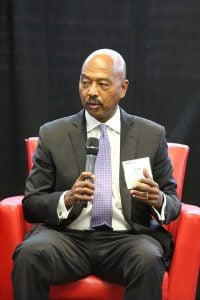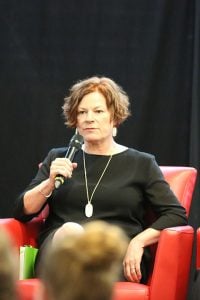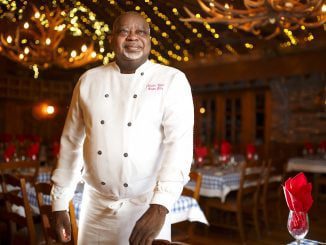RALEIGH — As Raleigh’s 2019 mayoral race approaches its final month, the six candidates met for a debate at PNC Arena hosted by the Raleigh Durham chapter of NAIOP, an influential association of commercial developers. John Skvarla, a former cabinet secretary in Gov. Pat McCrory’s administration, moderated the discussion.
Nancy McFarlane, the current mayor of the state’s capital, declined to run for another term after successful campaigns in 2011, 2013, 2015 and 2017. This cleared a path for a number of candidates to vie for the open seat. The election is set for Oct. 8.

Charles Francis, the only candidate to have run in the previous election, in 2017, fought McFarlane to a run-off after neither earned a majority in the first round. In the run-off, Francis, who was a federal prosecutor and co-founder of North State Bank, was defeated by McFarlane, after receiving 42% of the vote. The name recognition gained from this high-profile race could be an asset, but Francis told North State Journal, he is still the “change candidate,” since he is from the private sector.
Francis also wants to bring change to the city government by expanding the city council by up to three members in response to the area’s massive influx of residents, and he wants to increase the pay for the council to open it up to a more diverse demographic beyond the wealthy and retired who can afford to live on the meager salary.
Another candidate in the top tier is Caroline Sullivan, a former Wake County commissioner who now serves in Gov. Cooper’s administration. She is backed by the LGBTQ group EqualityNC and by the current mayor, Nancy McFarlane, who encouraged her to run, according to Indy Week.
Sullivan said, during the debate, that the two main focuses for her would be security and “preparing for growth in the future.” This second category, she said, includes zoning, transportation and quality of life issues.
Mary-Ann Baldwin, also considered a top contender, sat on Raleigh’s city council for 10 years, telling North State Journal this would give her the ability to hit the ground running because she knows how the city’s government works inside and out. “There’s going to be a learning curve for anyone else that will be a year long. I just don’t think we have a year to wait for somebody to learn.”

Baldwin says her campaign’s major focus is housing affordability. Raleigh is dealing with a “housing crisis,” she told NSJ, and the current city council “has done zero to address this issue.” The problem, she said, is “partly a supply and demand issue and partly a property rights issue.”
The remaining three candidates are Justin Sutton, a young lawyer; Zainab Baloch, a progressive activist; and George Knott, a Raleigh native who simply describes himself as “a bass player.”
During the debate, most of the other candidates agreed with Baldwin that housing is a key issue for Raleigh at the moment.
“Housing has been dominating this campaign for a while, which is great,” Sullivan said, before proposing a citywide summit to come up with solutions on the issue. “Housing affordability issues are not going away.”
Baloch, who frequently brought the conversation to bigger picture topics like racism, immigration and federal leadership, also focused on the housing issue. “How the city can address all the different issues of affordable housing, transportation, density, etc. is through addressing the climate crisis.”
Knott said the issues with housing could be handled through “listening” and cited a recent community meeting he attended where residents said they didn’t feel heard. Sutton also said there was a growing disparity, and “a lot of it is caused by the affordable housing crisis” and that the city “needs to do more.”
With the host of the debate being a commercial development association, the candidates also spent time discussing potential developments in Raleigh like the Dorothea Dix Park project, the potential for a downtown soccer stadium and a proposed stone quarry on RDU Airport’s land.
They also discussed ways of making the development process easier, with Francis saying city hall takes too long to approve things and Baldwin saying this slow permitting process is “unacceptable.”
Knott served as comedic relief at times, saying at a couple of points that the others had answered the questions so well that he didn’t feel like adding anything. In the introductions for the noon lunch, Knott said, “Usually this is about the time I roll out of bed and put a t-shirt on. So, if I’m a little slow, that’s why.”
Baloch, who has ties to social justice activist organizations, said one of her main goals was to keep residents “safe from people like ICE.”
NSJ was able to connect with Baloch, Baldwin and Francis after the debate, and this was one issue they all agreed on — Cooper was right to veto the recent bill passed by the N.C. General Assembly requiring sheriffs to work with ICE.
“We shouldn’t allow our residents to be targeted by outside forces,” Baloch said. “… especially since most of these people taken to these detention centers are people who are just stopped without an ID or stopped because they were speeding.”
Baldwin said, “[Sheriff] Baker was elected because of that. That was his platform basically.” She also said it was important for all Raleigh’s residents not to live in fear, and if ICE wants access to a prisoner, they should produce a “legitimate warrant.”
“Honestly, I think Cooper did the right thing in vetoing that bill,” Francis told NSJ. “That cooperation isn’t the best thing for making the immigrant community feel secure in interacting with law enforcement.”


